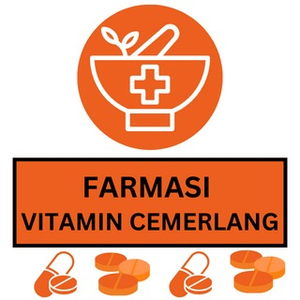Search
1/3
RM21.90
Seven Seas Cod Liver Oil | 100's capsule | EXP 02/2026
Sold by Farmasi Vitamin Cemerlang
5(4)
14 sold
Select options
Select
Shipping
From RM4.90
Est. delivery by Apr 17 - Apr 20
Specifications
Customer reviews (4)

M**
Item: Lalai
Harga berpatutan. Penghantaran cepat. Bagus untuk kesihatan .

December 4, 2024
C**🍫
Item: Lalai
Packaging sangt safety



More
November 20, 2024

a**k o** t** t**k
Item: Lalai
Boru cba tgk kesan
December 30, 2024

a**k o** t** t**k
Item: Lalai
Fast delivery
March 4, 2025

Farmasi Vitamin Cemerlang
71 items
Shop performance
Better than 84% of other shops
Ships within 2 days
84%
Responds within 24 hours
100%
About this product
- Manfaat Kesihatan:Metabolisme,Pengurusan Kolesterol
- Julat Umur:Dewasa
- Keadaan Produk:Kapsul
- No. MAL:MAL06051342X
Product description
The Health Benefits
Cod liver oil, as its name suggests, is oil extracted from the liver of cod. It is rich in Omega-3 fatty acids. You can also get omega-3 from eating foods such as tuna, herring and mackerel and by taking a supplement such as Seven Seas Cod Liver Oil One A Day although supplements should not replace a balanced diet and healthy lifestyle.
As well as omega-3, cod liver oil is also a reliable source of important nutrients including vitamin A & D. These important nutrients play a crucial role in your body.
Vitamin D supports the maintenance of normal bones and muscle function, and contributes to the normal function of the immune system.
A source of Omega-3
Two of the most important omega-3 fatty acids contained in fish oil are eicosapentaenoic acid (EPA) and docosahexaenoic acid (DHA).
Your body can’t make them from scratch; they can be converted from alpha-linolenic acid (ALA), which is another omega-3 fatty acid, however this conversion can be inefficient vitamin D1 and therefore it is best to make sure that DHA and EPA are included as part of a balanced diet.
This is why both adults and children should aim to consume two portions of fish a week, one of which should be oily. Additionally, you can also top up your diet with regular supplementation with a cod liver oil food supplement.
A source of Vitamin D
Vitamin D helps to regulate the amount of phosphate and calcium absorbed by the body and helps to keep bones, teeth, and muscles healthy.
Vitamin D is made by our bodies in reaction to sunlight on our skin. Most of us should be able to get vitamin D from sunlight from late March/April to the end of September. However, between October and early March we do not get any vitamin D from sunlight. In these months everyone should consider taking a daily supplement of vitamin D2.
How Much Do I Need?
In a change to previous advice, the Scientific Advisory Committee on Nutrition is now recommending a Nutrient Reference Value (NRV) for vitamin D of 15mcg, throughout the year, for everyone in the general UK population aged 4 years and above.
The NRV of 5mcg for the general UK population includes pregnant and lactating women and population groups at increased risk of vitamin D deficiency.
Breastfed babies from birth to 1 year of age should be given a daily supplement containing 8.5 to 10 micrograms of vitamin D to make sure they get enough.
Formula-fed babies should not be given a vitamin D supplement until they're having less than 500ml (about a pint) of infant formula a day, as infant formula is fortified with vitamin D2.
Children aged 1 to 4 years old should be given a daily supplement containing 10 micrograms of vitamin D2.
If you are concerned please speak with a healthcare professional.
Explore more from Farmasi Vitamin Cemerlang




4.8
396372sold
RM14.90
RM59.60
![[Jakim Halal] StemLabs Minyak Ikan Omega 3 1000mg EPA DHA Fish Oil EXP 11/2027](https://p16-oec-va.ibyteimg.com/tos-maliva-i-o3syd03w52-us/b94f723e01494c7baafd1c5d1e6ae439~tplv-o3syd03w52-crop-webp:2778:2778.webp?dr=15592&from=2378011839&idc=my2&ps=933b5bde&shcp=e1be8f53&shp=8dbd94bf&t=555f072d)
4.9
41911sold
RM15.00
RM24.90

![Infinity Neurocharge (60 tablets) [Vitamin B1, B6, B12, Alpha Lipoic Acid, ALA, Folic Acid]](https://p16-oec-sg.ibyteimg.com/tos-alisg-i-aphluv4xwc-sg/ad725b23c075418fb702ada8862a3647~tplv-aphluv4xwc-crop-webp:1280:1280.webp?dr=15592&from=2378011839&idc=my2&ps=933b5bde&shcp=e1be8f53&shp=8dbd94bf&t=555f072d)
4.8
71382sold
RM84.45
RM107.90


4.9
198719sold
RM18.90
RM75.60

4.7
38381sold
RM39.00
RM109.00

4.8
50806sold
RM99.00
RM150.00

4.9
68815sold
RM104.00
RM207.00


![Infinity Probiotic Plus (30 vegetable capsules)[Halal, Lactobacillus, Prebiotic]](https://p16-oec-sg.ibyteimg.com/tos-alisg-i-aphluv4xwc-sg/0026639f72034dce90d791aa92a96782~tplv-aphluv4xwc-crop-webp:1280:1280.webp?dr=15592&from=2378011839&idc=my2&ps=933b5bde&shcp=e1be8f53&shp=8dbd94bf&t=555f072d)
4.9
207263sold
RM64.72
RM84.90




4.9
56087sold
RM170.70
RM209.70


![[ JUS TIYARA ] - Minuman Herba Tradisional Berkualiti Tinggi & Premium](https://p16-oec-va.ibyteimg.com/tos-maliva-i-o3syd03w52-us/6a29d87a7fde46a89238ab247269e604~tplv-o3syd03w52-crop-webp:1200:1200.webp?dr=15592&from=2378011839&idc=my2&ps=933b5bde&shcp=e1be8f53&shp=8dbd94bf&t=555f072d)
No more products
Open TikTok





![Bio-Life Omega 3 Fish Oil [REPACKED] | LOOSE 30'S Capsules | Exp June 2026](https://p16-oec-sg.ibyteimg.com/tos-alisg-i-aphluv4xwc-sg/181411f39d9e46a1a08f7675edbc2e74~tplv-aphluv4xwc-crop-webp:1080:1080.webp?dr=15592&from=2378011839&idc=my2&ps=933b5bde&shcp=e1be8f53&shp=8dbd94bf&t=555f072d)










![[Promote] Nature’s Key Gummies Cuka Epal Vegan Gummies ACV dengan Asid Folik Vitamin B6 B12 Delima Bit 60 Kirran Health Jus Supplements](https://p16-oec-sg.ibyteimg.com/tos-alisg-i-aphluv4xwc-sg/e6645540eb08477b840e1fc9750b9b07~tplv-aphluv4xwc-crop-webp:1200:1200.webp?dr=15592&from=2378011839&idc=my2&ps=933b5bde&shcp=e1be8f53&shp=8dbd94bf&t=555f072d)

